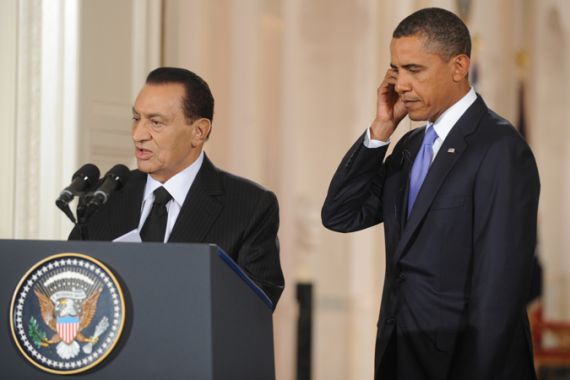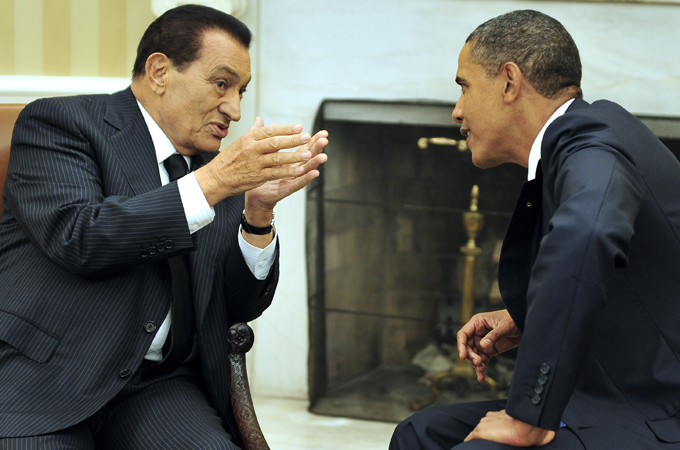Obama’s ‘Arab Problem’
Republicans attack Obama for “letting the Arab Spring happen”, despite previous support for former regional dictators

 |
| Obama used to refer to longtime Egyptian ruler Hosni Mubarak as a ‘friend’ of the US – and not as a dictator [EPA] |
During the past few months, Barack Obama has come under increasing pressure from his would-be Republican opponents, not for secretly subscribing to the faith of the enemy (Obama Muslim-baiting is so 2010), but for his supposed culpability in the events engulfing the Arab world during the past year.
On September 29, presidential hopeful Michele Bachmann told supporters, “You want to know why we have Arab Spring? Barack Obama has laid the table for the Arab Spring by demonstrating weakness from the United States of America.”
Just last week, another Republican presidential candidate, Newt Gingrich, pronounced the Arab Spring to be the result of the Obama foreign policy’s “grotesque failure”. Gingrich went so far as to call it an “anti-Christian spring”, apparently believing that longstanding authoritarian rule was the only thing protecting religious minorities in the Arab world from unbridled persecution.
But before the narrative of Obama’s “Arab Problem” conveniently replaces his “Muslim Problem” in the run-up to the 2012 presidential election, it is instructive to examine the actual posture of this administration toward Arab revolutions from Tunisia to Yemen.
While many commentators mocked the likes of Bachmann and Gingrich for being so out of touch with international and US public opinion as to paint an ominous portrait of the Arab Spring, the Republican candidates are right to raise concerns about these revolutionary movements. For those who envision an imperialistic United States continuing to protect its interests in the Middle East at the expense of indigenous populations, the possibility of struggles for liberation from dictatorship and foreign hegemony pose a troubling prospect.
Where right-wing politicians go wrong is in placing the blame for these popular revolutions at Obama’s feet. Mitt Romney, another Republican presidential contender, complained, “we’re facing an Arab Spring which is out of control in some respects because the president was not as strong as he needed to be in encouraging our friends to move toward representative forms of government”. In fact, at no point during his time in office has Obama wavered from the longstanding commitment by successive US administrations to defend America’s primary interests in the region: securing unfettered access to oil, protecting Israel from regional foes and international condemnation, and projecting US military strength against would-be contenders, whether they be global superpowers such as the former Soviet Union or regional competitors such as Iran.
In order to safeguard these strategic goals, the US government – irrespective of the political party in office – has actively bolstered the position of authoritarian governments across the Arab world. From 1987, the year that Zine el Abidine Ben Ali took power in Tunisia, until he was forced out in January 2011, the United States provided his government with more than $600m worth of weapons sales and military aid, nearly half of which came under the Obama administration. In fact, just a few months before the Tunisian people launched their popular revolt against Ben Ali, a Pentagon official justified the latest weapons deal, arguing that “[it] will contribute to the foreign policy and national security of the US by helping to improve the security of a friendly country that has been and continues to be an important force for economic and military progress in North Africa”.
US aid to Egypt, to the tune of $2bn per year since 1979, is well-known to many. Of that amount, barely ten per cent is allocated for economic aid for Egyptians. The rest is designated almost entirely to supporting its military, which served as the backbone for the repression of Hosni Mubarak’s regime for decades (while, incidentally, not engaging in any foreign wars during the same period as a result of the peace treaty with Israel that provided it with this military aid package in the first place).
Ally or dictator?
This hardly jives with the notion that Obama wavered from the United States’ commitment to supporting its authoritarian allies, or “friends”, as Romney affectionately termed them. In fact, when asked whether the US government considered Mubarak a dictator, both Obama and Vice President Joe Biden separately asserted that Mubarak was not a dictator, simply because he was an ally. This moment of inadvertent honesty was not lost on the people of Egypt, who did not hesitate to apply the label to their unelected ruler of three decades, regardless of how dependable he may have been to his friends in the US.
Beyond providing words of reassurance, the Obama administration has also taken concrete steps to ensure that, even in the aftermath of widespread popular revolts, the regional order in which it had invested so much would not be jeopardised. It dispatched Assistant Secretary of State for Near East Affairs Jeffrey Feltman to Tunisia just days after the fall of Ben Ali, to reassure the world that there was no threat of similar revolutions in neighbouring countries. As hundreds of thousands of Egyptians were gathering in Tahrir Square in Cairo, Feltman observed that, “what happened in Tunisia strikes me as uniquely Tunisian”.
Just one week later, Obama proved to be behind the curve yet again, directing lobbyist Frank Wisner to Egypt to assist Mubarak in averting a popular revolution that would completely overthrow his regime. Wisner stated that, “President Mubarak’s continued leadership is critical”, a position the Obama administration only disavowed once it became clear that nothing short of Mubarak’s total removal from power would satisfy the protesters.
Stability without representation
Even in Libya, where the US had seemingly taken a stronger stance in favour of the rebels by supporting a NATO mission against Muammar Gaddafi, the situation was not that clear-cut. In its storied on-again, off-again relationship with the Libyan dictator, the US had actually reached an accommodation with Gaddafi, brokered chiefly by then-Assistant Secretary of State David Welch in 2008. Documents uncovered by Al Jazeera reveal that Welch continued to advise the Libyan government as recently as August, during the height of the fighting between the military and anti-Gaddafi rebels backed by NATO. While Welch’s actions do not represent the Obama administration’s official policy, they reflect a perspective within some policymaking circles in Washington that would even prefer the unstable and often deranged Gaddafi to the possibility of an Arab government that would truly represent the aspirations of its people.
In countries where popular revolts have been brutally suppressed to great effect, the Obama administration’s policy appears largely unchanged, preferring to ride the status quo for as long as conditions will allow. It relies heavily on the Yemeni regime to permit US drone attacks that have killed scores of civilians and at least two US citizens in that country without any semblance of legality. The administration has also maintained its strategic military presence in Bahrain, despite the violent crackdown against largely peaceful protests and the subsequent arbitrary show trials. And though there is no love lost between them; the US, along with Israel and Saudi Arabia, seem to prefer the certainty provided by the Assad regime in Syria to the unpredictability of a democratic government in a key strategic area of the Middle East.
‘The nature of foreign assistance’
As for the countries that have successfully toppled their regimes, US policy has demonstrated its ability to adapt to changing conditions on the ground by rushing to secure its interests under the guise of democracy promotion. The $100m that the administration has pledged to that end has come under the scrutiny of activists and movement leaders on the ground in Tunisia and Egypt, where the fear is that such a generous flow of funds could go a long way to subvert the democratic process by promoting the advancement of parties favourable to US interests. Such questions have already been raised in Egypt, where just last week the Supreme Council of the Armed Forces (SCAF) announced that it would block any investigation into the management and distribution of US funds. Aside from being inherently anti-democratic, such a lack of transparency raises important questions about the nature of foreign assistance during a delicate stage in the revolution.
The recent election results in Tunisia, which witnessed a commanding victory by the Ennahdha party, has challenged a longstanding regional order. For the past half-century, the United States’ Middle East policy has been dedicated in large part to the marginalisation of Islamist political forces that are deemed to pose a threat to US interests. With the Muslim Brotherhood in Egypt poised to make a strong showing in the upcoming parliamentary elections, it stands to reason that some Egyptians would be wary of US interference. This is especially true when there has been little evidence to suggest that the US would respect the democratic choices of Arab societies, something it has failed to do in the past.
For those who continue to hope that Obama will retroactively merit the Nobel Peace Prize he won just months after taking office, it appears that they will have to wait a little while longer, the occasional riveting speech notwithstanding. Obama’s flowery rhetoric on the Arab Spring has rung hollow with the vast majority of people in the region, especially as his administration continues to thwart Palestinian efforts to achieve (mostly symbolic) recognition at the United Nations. This begs the question of how the US president can be taken at his word as one who stands with the people of Egypt and Tunisia in their struggles for freedom, when Palestinians have endured that struggle for more than six decades.
Without missing a beat, Obama’s Republican opponents have used this as an opportunity to attack his Middle East policy nonetheless. Last September, on the eve of Obama’s UN address – the most hawkish foreign policy speech of his presidency – Texas governor Rick Perry labelled the administration’s policy “naïve, arrogant, misguided, and dangerous”.
Seemingly cementing Obama’s “Arab Problem”, Perry summed up his point by emphatically saying, “the Obama administration has appeased the Arab street at the expense of our national security”.
Unfortunately for Perry, Obama can confidently assert that nothing could be further from the truth.
Abdullah Al-Arian is an Assistant Professor of History at the department of History at Wayne State University and recently received his PhD from Georgetown University specialising in the Muslim Brotherhood.
The views expressed in this article are the author’s own and do not necessarily reflect Al Jazeera’s editorial policy.
